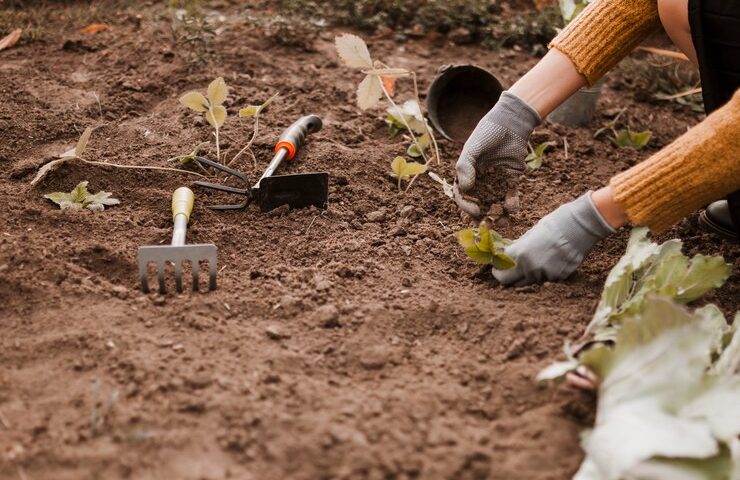Healthy soil is the foundation for a thriving and blooming garden. It affects everything, from how easily you can dig to the yield of your plants. Poor soil quality can lead to numerous problems: hard-to-dig soil that erodes easily and plants that starve for nutrients and water. This may result in low-yielding, unattractive plants that die young.
To ensure your residential garden maintenance does not fall short due to poor soil, it is crucial to understand the factors that affect soil quality and adopt techniques to improve it organically.
In this blog, we look at some landscaping and gardening solutions to improve soil quality.
The Importance of Soil Health
Healthy soil is fertile, well-draining yet moisture-retentive, and rich in organic matter. It supports a complex ecosystem of microorganisms, earthworms, and other beneficial organisms contributing to the nutrient cycle.
Poor soil, on the other hand, leads to various issues:
- Soil Fertility: Without adequate nutrients, plants can’t grow strong or produce abundant flowers, fruits, or vegetables.
- Compaction: Hard, compacted soil is difficult to work with and restricts root growth.
- Erosion: Weak soil structure makes soil prone to erosion by wind and water, leading to loss of topsoil.
- Water Retention: Poor soil drains too quickly, leaving plants thirsty or retaining too much water, causing root rot.
Factors That Affect Soil Quality
Before you start garden maintenance in your Sydney home, it is crucial to understand what influences soil quality. This will allow you to identify problems and implement solutions.
- Soil Texture: The sand, silt, and clay ratio determines how well soil drains and holds nutrients. Sandy soil drains quickly but doesn’t hold nutrients well, while clay soil retains water and nutrients but can become waterlogged and hard.
- Soil pH: Soil’s acidity or alkalinity affects nutrient availability and microbial activity. Most garden plants prefer a slightly acidic to neutral pH (6.0-7.0). Soil pH outside this range can lock up nutrients, making them unavailable to plants.
- Soil Nutrients: Essential nutrients like nitrogen, phosphorus, and potassium are vital for plant growth. These macronutrients and micronutrients, such as iron, manganese, and zinc, support various physiological functions in plants.
- Soil Microorganisms: Bacteria, fungi, and other microorganisms decompose organic matter, releasing nutrients and improving soil structure. A healthy soil microbiome is critical for nutrient cycling and disease suppression.
Techniques to Improve Soil Quality Organically
To improve soil quality, you need not add synthetic chemicals to your residential garden maintenance routine. Numerous organic techniques can enhance soil health:
- Rotate Crops: Changing the types of plants grown in a particular area each season helps prevent nutrient depletion and reduces pest and disease cycles. Different plants have varying nutrient needs and pest resistance, which helps maintain soil balance.
- Soil Composition: Regularly adding organic matter such as compost or aged manure improves soil structure, increases nutrient content, and enhances water retention. Compost adds beneficial microorganisms, while manure provides a slow-release source of nutrients.
- Encourage Earthworms: Earthworms aerate the soil, break down organic matter, and excrete nutrient-rich castings, all of which improve soil health. Creating a habitat that attracts earthworms, such as adding mulch and compost, can significantly benefit your soil.
- Adding Nutrients: Organic fertilisers, compost, and manure enrich the soil with essential nutrients without harming the environment. These amendments release nutrients slowly, ensuring a steady supply for plants.
- Manage Weeds: Weeds compete with garden plants for nutrients and water. Hand-pulling or using organic mulches can keep weeds under control without chemicals. Mulches also protect the soil surface from erosion and moisture loss.
- Cover Crops: Growing cover crops like clover or vetch during off-seasons adds organic matter, prevents erosion, and fixes nitrogen in the soil. These crops decompose and release nutrients when they are tilled into the soil.
- Mulching: Mulch conserves moisture, regulates soil temperature, suppresses weeds, and slowly adds organic matter as it decomposes. Organic mulches like straw, leaves, and wood chips are particularly beneficial.
- No-Till Gardening: Reducing tillage preserves soil structure, promotes microbial activity, and reduces erosion. No-till gardening minimises soil disturbance, which helps maintain a stable environment for soil organisms.
Plants and Amendments to Enrich Soil Fertility
Certain plants and organic amendments can significantly enhance soil fertility:
- Nitrogen-Fixing Plants: Legumes such as peas, beans, and clover fix atmospheric nitrogen into the soil, enriching it naturally.
- Dynamic Accumulators: Plants like comfrey and dandelion accumulate nutrients from deep within the soil and bring them to the surface, making them available to other plants.
- Soil-Building Crops: Green manures and cover crops, such as rye or buckwheat, add organic matter and nutrients to the soil when tilling back into the ground.
The Last Word
Improving soil quality is a rewarding endeavour that yields numerous benefits for your garden. Stop with searches like ‘gardener near me’ and pick up your own tools. By focusing on the essential factors that affect soil health and adopting organic techniques, you can develop a rich and fertile garden at home.
With patience and persistence, cultivate a garden that’s not only more productive and beautiful but also more resilient and sustainable. You can also opt for artificial turf installation to further enhance the beauty of your garden.
At Dr. Garden, we have skilled garden landscapers who can help you with all your garden maintenance demands in Sydney. Contact us today for more information.

